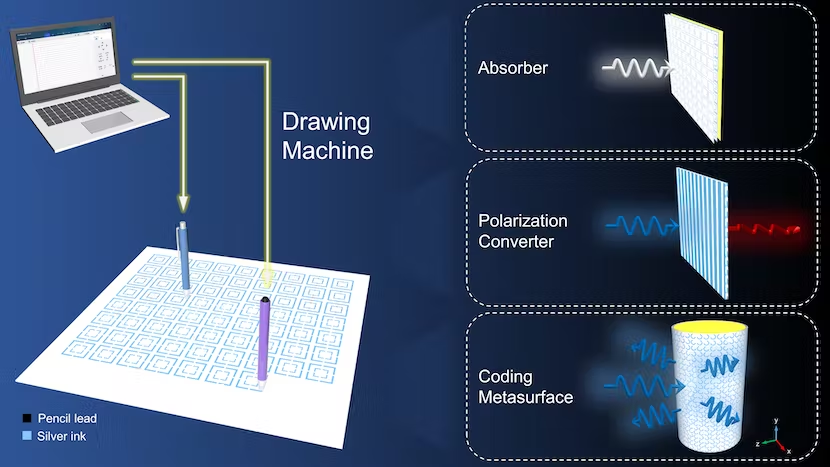An Automatic Drawing Machine for Producing Paper Metamaterials
An Automatic Drawing Machine for Producing Paper Metamaterials
Metamaterials are described as synthetically created composite materials whose structured microstructures, rather than the materials’ chemical components, determine their properties. In other words, they are engineered materials with properties that aren’t found in nature. Researchers from Nanjing University has capitalized on those properties by designing an hat uses pens and pencils to transfer metamaterials onto paper.
A new paper from that team describes their novel technique, which uses a ballpoint pen with conductive ink to draw conductors and mechanical pencils to draw resistors and resistive films. These were incorporated into a computer-controlled drawing machine that makes the deposition process more automatic with increased accuracy. “Although paper-based metamaterials have been made previously using inkjet printing technology, our drawing technique is lower cost, simpler and more flexible,” explains research team lead Junming Zhao. “Our method could be useful for making reconfigurable antennas and metalenses as well as metamaterial devices that absorb incident electromagnetic energy from cell phones or other sources.”
The machine is outfitted with three stepper motors, two of which are used to move the pen or pencil in a horizontal plane, and the third is used to lift or lower the writing instrument in a vertical plane. A computer regulates the drawing machine’s characteristics, including movement speed, much like a CNC machine. Using those conductive ink pens and graphite pencils, the researchers created three paper-based materials, including a polarization converter, an absorber, and a conformal coding metasurface, employing their unique drawing technique.
Metamaterials are described as synthetically created composite materials whose structured microstructures, rather than the materials’ chemical components, determine their properties. In other words, they are engineered materials with properties that aren’t found in nature. Researchers from Nanjing University has capitalized on those properties by designing an automatic drawing machine that uses pens and pencils to transfer metamaterials onto paper.
A new paper from that team describes their novel technique, which uses a ballpoint pen with conductive ink to draw conductors and mechanical pencils to draw resistors and resistive films. These were incorporated into a computer-controlled drawing machine that makes the deposition process more automatic with increased accuracy. “Although paper-based metamaterials have been made previously using inkjet printing technology, our drawing technique is lower cost, simpler and more flexible,” explains research team lead Junming Zhao. “Our method could be useful for making reconfigurable antennas and metalenses as well as metamaterial devices that absorb incident electromagnetic energy from cell phones or other sources.”
The machine is outfitted with three stepper motors, two of which are used to move the pen or pencil in a horizontal plane, and the third is used to lift or lower the writing instrument in a vertical plane. A computer regulates the drawing machine’s characteristics, including movement speed, much like a CNC machine. Using those conductive ink pens and graphite pencils, the researchers created three paper-based materials, including a polarization converter, an absorber, and a conformal coding metasurface, employing their unique drawing technique.

They demonstrated that the polarization converter could rotate linear polarization by 90° between 3.1 and 6.6 GHz with a conversion efficiency of over 90%. The absorber weighed only 58.3 gm and had 90% absorptivity between 2.1 GHz and 10.5 GHz, while the metasurface was developed for radar cross-section reduction, a technique for concealing the radar signal in ships and aircraft utilized by the military.
International Conferences on Composite Materials
https://composite-materials-conferences.sciencefather.com/





Comments
Post a Comment